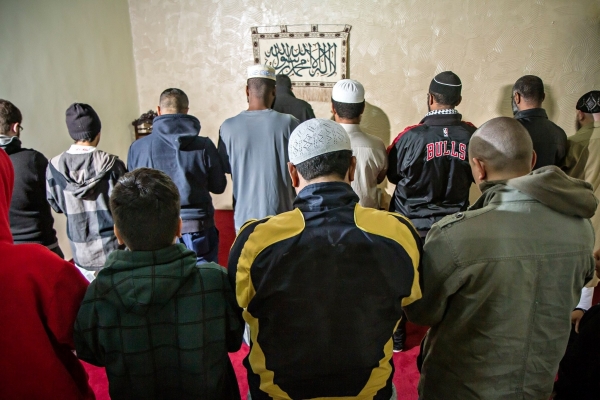

By: Tulio Kruse
Source: The Intercept
In a hall full of high-ranking military officers in Brazil’s Chamber of Deputies, a screen transmits images of a man with a long gray beard, glasses, and a kufi, a knit cap worn by many devout Muslim men. In the first photo, a man with white hair appears at a protest with Palestinian flags. In the next, he’s beside a woman with her hair covered by a hijab. The two are standing on a rooftop in a favela, as informal settlements are called in Brazil.
“This photo was taken in Maré,” a large favela in Rio de Janeiro, the lecturer explained. “What are these people doing there? What is their goal?”
https://www.youtube.com/watch?v=t0ZTicGCALA
The man in the photos is Cesar Mateus Rosalino, 42, a well-known artist, community leader, and activist who lives about 300 miles west of Maré in Embu das Artes, a community situated on the far outskirts of the sprawling megalopolis of São Paulo. After converting to Islam, Cesar adopted the name Kaab Al-Qadir — which is common among Brazilian converts. His story has been told a number of times in interviews with the Brazilian press. The media became interested in Qadir after he established a prayer room in 2013 in the heart of the Cultura Física favela, in Embu das Artes, which has since been transformed into a mosque. He earns his living producing cultural events supported by public grants, as well as workshops and lectures that he offers at Embu’s schools. He’s also part of a cultural association in the favela, Zumaluma, that offers courses in computing, dance, and art, which are sometimes financed by the city government.
In 2016, the only prayer room in this favela in the Embu das Artes area of São Paulo was remodeled and turned into the Summayah Bint Khayyat mosque, named after an Ethiopian slave who, according to Islamic texts, was the first martyr in that region.
It was on the rooftop of the house where he lives — and not in Rio de Janeiro — where he posed with his friend for the photo, shot for a segment on a corporate news radio station, CBN, which correctly identified the location. Cesar said he has never been to the Maré favela.
No formal accusation of terrorism has ever been brought against him, nor is there any evidence that he has done anything to provoke such suspicions. Nonetheless, his face was displayed to 138 military officials, students in the Advanced Military Studies course at the Brazilian Army Command and General Staff School, as well as alumni who had gone on to become colonels and generals. The topic of the lecture was preparations for terrorist attacks, and it was sponsored by the Foreign Relations and National Defense Committee (CREDN) of Brazil’s Lower House of Congress, delivered on the afternoon of July 4 and transmitted live by Chamber of Deputies TV.
On stage, CREDN’s international affairs and communications adviser, the former journalist Marcelo Rech, accused the individuals photographed at the protest of “sympathizing with jihad” and then questioned their “intentions.” Rech did not present any concrete information about who they were and why they were being presented in this way. “There’s no way to know to what degree they are extremists,” Rech said cryptically.
The episode exemplifies the recent change in the local authorities’ stance on Islam in Brazil. The same federal government that once promoted campaigns against religious intolerance has, since president Dilma Rousseff’s impeachment and the ascension of Michel Temer, been responsible for a series of cases in which law enforcement agencies have designated suspects or taken actions based on stereotypes about Muslims, extrapolating concrete evidence they had against their targets — a practice more commonly known as profiling. It was in this context and on the eve of the Rio Olympics that the Brazilian Intelligence Agency (Abin), freshly devolved to military control after a brief stint under civilian leadership, launched a campaign that spread the fear of terrorism. In collaboration with the Federal Police, Abin also participated in “Operation Hashtag,” which led to the arrest of 14 suspected members of an alleged “terrorist cell.” Brazil was full of questions about the real threat the group may have posed. Judge Marcos Josegrei da Silva, who issued the arrest warrants, even said that “you can not say that these people are terrorists, that they will commit such acts.” Brazil has no history of attacks linked to Islamic terrorism.
Read the full, shocking report at The Intercept. Please keep the Ummah in your prayers.



